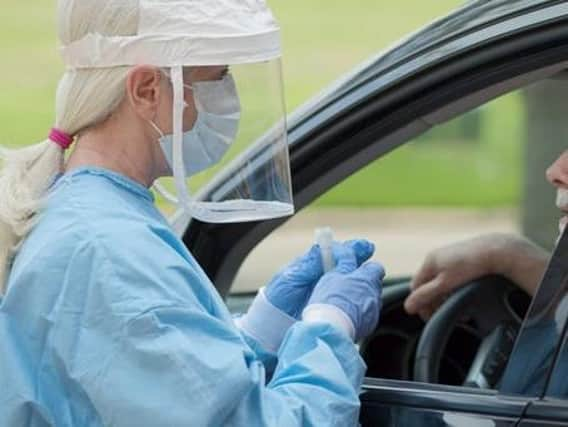Covid 19 variant discovered by Yorkshire scientists is 'under investigation'


Public Health England (PHE) said 49 confirmed cases of the variant, known as VUI-21MAY-01 or AV.1, have been recorded in the UK and they are “mainly concentrated in Yorkshire and the Humber” but it is not currently being treated as a variant of concern.
In a statement, PHE said: “There is currently no evidence that this variant causes more severe disease or renders the vaccines currently deployed any less effective.
Advertisement
Hide AdAdvertisement
Hide Ad“PHE is carrying out increased laboratory testing to better understand the impact of the mutations on the behaviour of the virus.”
Scientists from the University of Sheffield detected the variant when they carried out routine surveillance sequencing on nose and throat swabs taken at hospitals in Sheffield in April and May.
Matthew Parker, a bioinformatician involved with the sequencing, said this variant is similar to one found in several countries last year but it has "gained a lot more mutations".
He said: "It has 10 spike mutations in total and three of those are found in other variants of concern. So that's why it's now under investigation.
Advertisement
Hide AdAdvertisement
Hide Ad"They're doing lab studies now to see if it has any effect on the virus itself or whether it makes it more transmissible or more severe."
He added: "Its original location is as yet unknown and I think we might never find out."
Greg Fell, Director of Public Health in Sheffield, said there is "no evidence" to suggest this strain is any more transmissible than other strains identified in the UK.
He added: "Please don’t be alarmed, we want you to continue doing what you have been for the past year. Follow the guidance, continue to wash your hands regularly and wear a mask indoors.”
Advertisement
Hide AdAdvertisement
Hide AdB.1.1.7, which was first detected in Kent in September, remains the dominant strain in the UK, as more than 249,600 confirmed cases have been recorded.
But there are growing concerns about the spread of the Indian variant, known as B.1.617.2 or VOC-21APR-02, which has infected 3,424 people in the country since it was first detected.
Public health experts say it is at least as transmissible as the Kent variant (B.1.1.7) and they believe it has driven a recent surge in cases in several areas of the UK, including Bolton, Bedford and Blackburn with Darwen.
Public Health England stated cases of the Indian variant are “predominantly affecting the North West of England – particularly Bolton – and London” but there are “clusters of cases across the country”.
Advertisement
Hide AdAdvertisement
Hide AdDr Jenny Harries, Chief Executive of the UK Health Security Agency, said: “It is absolutely vital that people living in areas where prevalence is high come forward to get the vaccine.
“It is the best defence we have against the spread of this disease. As we start to get back to normal life, it is very important that we do not become complacent.
“All of us need to remain responsible and vigilant. Get tested regularly, get the vaccine when offered it, and practise hands, face, space, fresh air. It will save lives.”
Earlier this week, Health Secretary Matt Hancock announced Kirklees is one of six areas that will be provided with surge testing and additional vaccine doses, saying “ rates are rising” and the government “need to act fast”.
Advertisement
Hide AdAdvertisement
Hide AdHe said the decision was made after the government analysed the number of cases and hospitalisations in each area, the spread of new variants, the amount of viral fragments in wastewater and travel patterns.
It came after a number of cases of the Indian variant (B.1.617.2) were detected in Huddersfield, but on Tuesday Kirklees Council they were “in one household” and it is working to contain the outbreak.
Kirklees has the fourth highest infection rate in England, of 72.1 cases per 100,000 people, after it recorded 317 new cases over seven days.
Comment Guidelines
National World encourages reader discussion on our stories. User feedback, insights and back-and-forth exchanges add a rich layer of context to reporting. Please review our Community Guidelines before commenting.